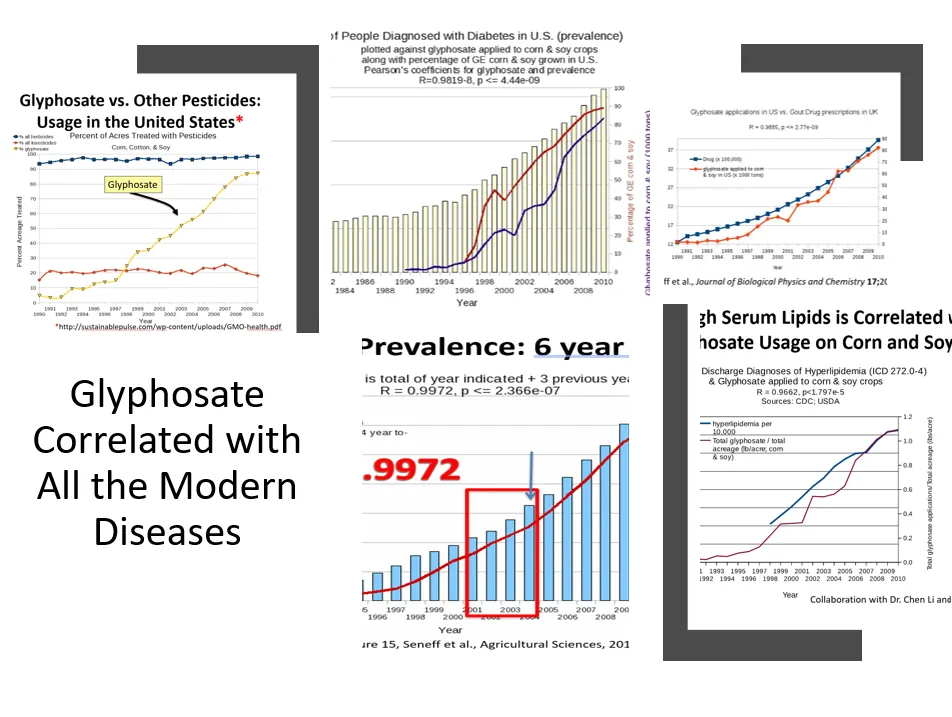The Hidden Dangers of Glyphosate and How to Combat Them
In recent years, there's been growing concern about the impacts of glyphosate on our health and the environment. Glyphosate, the active ingredient in the herbicide Roundup, is widely used in agriculture to control weeds. However, its pervasive use has raised alarms due to its potential links to various modern diseases, prompting several countries, including many in Europe, to ban its use. This blog post will delve into the problems associated with glyphosate, its effects on health, and practical steps you can take to mitigate its impact, focusing on anti-inflammatory foods and lifestyle actions.
The Problems with Glyphosate
Glyphosate is known for its effectiveness in controlling weeds, but its impact on human health and the environment is far-reaching and concerning. Here are some key issues:
- Disruption of Gut Health:
- Glyphosate disrupts the gut microbiome by killing beneficial bacteria and allowing harmful bacteria to thrive. This imbalance can lead to gut inflammation and has been linked to conditions such as irritable bowel syndrome (IBS) and inflammatory bowel disease (IBD).
- Sulfate Deficiency:
- Glyphosate interferes with the body's ability to synthesize and utilize sulfate, an essential nutrient for detoxification, cellular function, and maintaining the integrity of the gut lining. Sulfate deficiency can contribute to neurological disorders, stunted growth, and reproductive issues.
- Chelation of Essential Minerals:
- Glyphosate chelates (binds) important minerals such as iron, zinc, and cobalt, making them unavailable for use by the body. This can lead to deficiencies that affect various bodily functions, including immune response and enzyme activity.
- Endocrine Disruption:
- Glyphosate acts as an endocrine disruptor, interfering with hormone function and potentially leading to reproductive issues, developmental problems, and increased risk of cancers.
- Increased Risk of Chronic Diseases:
- Studies have linked glyphosate exposure to an increased risk of chronic diseases, including autism, diabetes, cardiovascular diseases, and certain types of cancer.

Europe's Ban on Glyphosate
Recognizing these risks, many European countries have taken action to ban or severely restrict the use of glyphosate. This move reflects growing awareness and precautionary measures to protect public health and the environment. The European Union has been at the forefront of these efforts, pushing for safer alternatives and more sustainable agricultural practices.
Combating Glyphosate's Effects with Anti-inflammatory Foods and Actions
While avoiding glyphosate entirely can be challenging, especially in countries where it is still widely used, there are several steps you can take to reduce your exposure and support your body's health:
- Studies have linked glyphosate exposure to an increased risk of chronic diseases, including autism, diabetes, cardiovascular diseases, and certain types of cancer.
- Adopt an Organic Whole Foods Diet:
- Choose organic produce to minimize glyphosate intake. Organic farming practices do not allow the use of glyphosate, reducing your exposure to this harmful chemical.
- Incorporate Anti-inflammatory Foods:
- Turmeric and Curcumin: Turmeric contains curcumin, a powerful anti-inflammatory compound. Adding turmeric to your diet can help reduce inflammation and support overall health.
- Leafy Greens: Spinach, kale, and other leafy greens are rich in antioxidants and anti-inflammatory compounds.
- Berries: Blueberries, strawberries, and raspberries are high in antioxidants that combat inflammation.
- Nuts and Seeds: Almonds, walnuts, chia seeds, and flaxseeds are good sources of anti-inflammatory omega-3 fatty acids.
- Fatty Fish: Salmon, mackerel, and sardines are rich in omega-3 fatty acids, which have potent anti-inflammatory effects.
- Use Detoxifying Agents:
- Activated Charcoal and Bentonite Clay: These substances can bind to toxins and help remove them from the body.
- Humic and Fulvic Acids: These natural compounds enhance nutrient absorption and detoxification processes.
- Sauerkraut Juice: Fermented foods like sauerkraut juice support gut health and can help reduce glyphosate toxicity.
- Boost Sulfate Intake:
- Magnesium Sulfate (Epsom Salt) Baths: Soaking in an Epsom salt bath can help your body absorb sulfate through the skin, supporting detoxification and relaxation.
- Sulfur-Rich Foods: Incorporate foods like garlic, onions, and cruciferous vegetables (broccoli, cabbage, Brussels sprouts) that are high in sulfur.
- Get Adequate Sunlight:
- Exposure to sunlight helps your body produce vitamin D and cholesterol sulfate, which are crucial for maintaining vascular health and overall well-being. Aim for moderate sun exposure without sunscreen for short periods to boost these benefits.
- Maintain a Healthy Gut Microbiome:
- Probiotics and prebiotics can help restore and maintain a healthy balance of gut bacteria. Foods like yogurt, kefir, sauerkraut, and other fermented foods are excellent sources of probiotics.
- Stay Hydrated and Active:
- Drink plenty of water to support detoxification processes and engage in regular physical activity to boost circulation and overall health.

Conclusion
The widespread use of glyphosate poses significant health risks, but you can mitigate its impact by making informed dietary and lifestyle choices. Embracing an organic, whole-food diet rich in anti-inflammatory foods, boosting sulfate intake, supporting gut health, and ensuring adequate sunlight exposure are practical steps you can take to protect your health. As Europe leads the way in banning glyphosate, it is crucial to advocate for similar measures globally and prioritize practices that support a healthier, more sustainable future.
If you have comments or questions and wish to contact me, leave a comment or reach out.
- Drink plenty of water to support detoxification processes and engage in regular physical activity to boost circulation and overall health.











